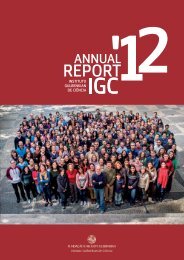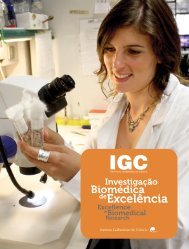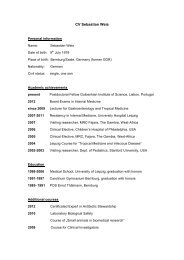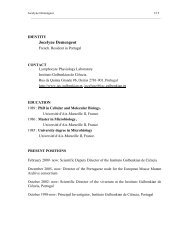organisation - the Instituto Gulbenkian de Ciência
organisation - the Instituto Gulbenkian de Ciência
organisation - the Instituto Gulbenkian de Ciência
- No tags were found...
You also want an ePaper? Increase the reach of your titles
YUMPU automatically turns print PDFs into web optimized ePapers that Google loves.
COMPLEX ADAPTIVE<br />
SYSTEMS AND<br />
COMPUTATIONAL BIOLOGY<br />
Luis Mateus Rocha Principal Investigator<br />
PhD in Systems Science, State University of New York, 1997<br />
Postdoctoral Fellow, Los Alamos National Laboratory (NM. USA)<br />
Associate Professor, Indiana University, USA<br />
Principal Investigator at <strong>the</strong> IGC since 2000<br />
link to external website<br />
We are interested in <strong>the</strong> informational properties of natural and artificial systems<br />
which enable <strong>the</strong>m to adapt and evolve. This means both producing computational<br />
mo<strong>de</strong>ls of biological systems to un<strong>de</strong>rstand <strong>the</strong> evolutionary role of<br />
information, as well as abstracting principles from biology to produce adaptive<br />
information technology. Our current research projects are on complex dynamics<br />
in biological networks (gene regulation, cell signalling, and metabolic networks),<br />
text and literature mining (in proteomics, protein-protein interaction<br />
and pharmokinetics), computational mo<strong>de</strong>ls of RNA editing, artificial immune<br />
systems, genomic multivariate analysis, evolutionary systems, artificial life, cognitive<br />
science, and biosemiotics.<br />
BIOMEDICAL LITERATURE MINING<br />
The aims are to carry out literature-based automatic discovery, classification<br />
and annotation of protein-protein and gene-disease interactions, pharmokinetic<br />
data, protein sequence family and structure prediction, functional annotation<br />
of transcription data, enzyme annotation publications, etc.<br />
We are currently looking at automated mechanisms for document classification<br />
and obtained preliminary results that are being prepared for publication.<br />
This entails close collaborations with Analia Lourenço (Minho) and Hagit Shatkay<br />
(Queens University, Canada).<br />
COLLECTIVE DYNAMICS IN COMPLEX BIOCHEMICAL NETWORKS<br />
Mo<strong>de</strong>lling of <strong>the</strong> dynamics of complex biochemical networks, to i<strong>de</strong>ntify control,<br />
modularity, robustness and collective computation. Currently working with<br />
mo<strong>de</strong>ls of genetic regulation in yeast, body segmentation in Drosophila, intracellular<br />
signal transduction in fibroblasts, a genome-scale transcriptional and<br />
metabolic network for E. coli, and o<strong>the</strong>rs.<br />
GROUP MEMBERS<br />
Manuel Marques-Pita (Post-doc)<br />
Artemy Kolchinsky (PhD Stu<strong>de</strong>nt)<br />
Aza<strong>de</strong>h Nematza<strong>de</strong>h (PhD Stu<strong>de</strong>nt)<br />
Tiago Simas (PhD Stu<strong>de</strong>nt)<br />
Alaa Abi-Haidar (PhD Stu<strong>de</strong>nt, left in January)<br />
Santosh Mannika (PhD Stu<strong>de</strong>nt, started in June)<br />
COLLABORATORS<br />
Anália Lourenço (Universida<strong>de</strong> do Minho, Portugal)<br />
Hagit Shatkay (Queen's University, Canada)<br />
Marta Cascante (University of Barcelona, Spain)<br />
Jim Crutchfield (University of California, Davis, USA)<br />
Santiago Schnell (Michigan University, USA)<br />
Luis Amaral (Northwestern University, USA)<br />
Chistof Teuscher (Portland State University, USA)<br />
Stefan Mass (Lehigh Univeraity, USA)<br />
Alekos Athanasiadis (IGC, Portugal)<br />
Jorge Carneiro (IGC, Portugal)<br />
Pedro Lima (<strong>Instituto</strong> Superior Técnico, Portugal)<br />
Porfirio Silva (<strong>Instituto</strong> Superior Técnico, Portugal)<br />
Nuno Crato (<strong>Instituto</strong> Superior <strong>de</strong> Economia e Gestão, Portugal)<br />
FUNDING<br />
Fundação para a Ciência e a Tecnologia (FCT), Portugal<br />
FLAD Computational Biology Collaboratorium, Portugal<br />
Uninova collaboration<br />
PUBLIC ENGAGEMENT IN SCIENCE<br />
Manuel Pita, Public lecture - AR, Champalimaud Centre for <strong>the</strong> Unknown,<br />
November<br />
We have completed <strong>the</strong> first year of our FCT fun<strong>de</strong>d R&D grant on studying collective<br />
information processing in biochemical networks.<br />
COMPUTATIONAL MODELS OF RNA EDITING<br />
We are building computational mo<strong>de</strong>ls to study <strong>the</strong> evolutionary implications of<br />
genotype editing in <strong>the</strong> living <strong>organisation</strong>. Our goal is twofold:<br />
1. To study <strong>the</strong> role of RNA Editing regulation in <strong>the</strong> evolutionary process;<br />
2. To investigate <strong>the</strong> conditions un<strong>de</strong>r which genotype edition improves <strong>the</strong><br />
optimisation performance of evolutionary algorithms.<br />
After <strong>de</strong>veloping a set of computational tools nee<strong>de</strong>d for a number of simulations<br />
and studies on artificial RNA editing systems, we are currently generating<br />
and analysing data in <strong>the</strong> context of our collaborations with Alekos Athanasiadis<br />
(IGC) and Stefan Mas (Lehigh).<br />
ARTIFICIAL MODELS OF T-CELL CROSS-REGULATION<br />
We use Carneiro's Mo<strong>de</strong>l of Cross-regulation in T-Cell dynamics to produce bioinspired<br />
algorithms for binary classification. The goal is to gain fur<strong>the</strong>r insights<br />
into T-cell cross-regulation in <strong>the</strong> vertebrate immune system, and produce useful<br />
bio-inspired algorithms for text mining and spam <strong>de</strong>tection. After one of our<br />
team members 'completion of his PhD on this project, we are currently re<strong>de</strong>fining<br />
<strong>the</strong> next goals, and approaches for its continuation, as well as preparing<br />
grant applications to hire new team members.<br />
STOCHASTIC MODELS OF TOPOLOGY CONSTRAINTS ON COMPLEX NETWORKS<br />
This project aims to study of transitive properties of complex networks mo<strong>de</strong>lled<br />
as weighted graphs. Studying <strong>the</strong> impact of alternative distance measures<br />
on scale free and small-World behaviour, and <strong>de</strong>veloping stochastic<br />
mo<strong>de</strong>ls of vertex aging in networks, to better predict network growth. Ongoing<br />
analysis of large-scale Wikipedia data, networks of neuronal activity, etc.<br />
Started collaboration with Nuno Crato (ISEG) to mo<strong>de</strong>l <strong>de</strong>cision-tree searches.<br />
IGC ANNUAL REPORT ‘11<br />
RESEARCH GROUPS<br />
59






